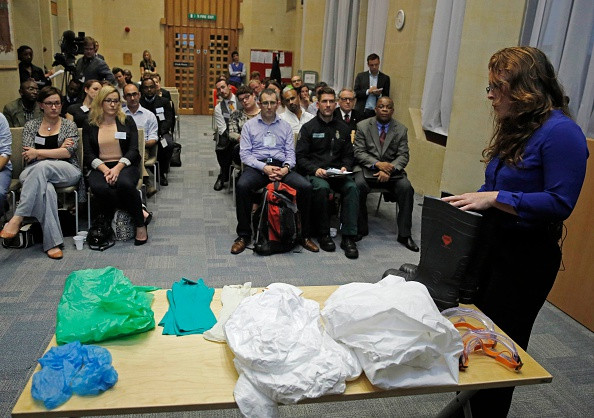Ebola Virus: Thirty NHS Volunteers Head to Sierra Leone to Work in Treatment Centres

Thirty NHS volunteers will arrive in Sierra Leone shortly to help the battle to contain the deadly Ebola virus which has claimed thousands of live in the region.
The first group comprises doctors, nurses and psychiatrists who will miss Christmas with their families in order to work in the treatment centres in the country's capital Freetown.
It's the first deployment of NHS staff as part of a series of measures implemented by the British government in a bid to curb the spread of the deadly disease.
Following nine days of intensive training in York, to prepare them to work with the victims, the group will complete a further week of training in Sierrra Leone before beginning work in the treatment centres to diagnose and treat those who have been infected with the virus.
I'm aware of the awful plight out there. They have treatment centres established but they've got to have staff who are able to work in those treatment centres.
British medic Gareth Ross said he felt compelled to make the trip to Sierra Leone and offer his support.
"It's a place that's very close to my heart and I can't abide the suffering out there," he explained.
Nurse Donna Wood reiterated the sentiment, highlighting the need for trained staff to support the victims. "I'm aware of the awful plight out there. They have treatment centres established but they've got to have staff who are able to work in those treatment centres," she said.
Dr Hannah Ryan, from the intensive care unit at Aintree University Hospital said: "I guess there are many reasons I volunteered for this; I am interested in infectious disease medicine, I have always wanted to do humanitarian work, I wanted to take on the challenge of working in this complex environment.
"But mainly I found myself less and less able to hear about the evolving situation in west Africa and the increasing loss of life and do nothing. I felt I just had to go."
Health Secretary Jeremy Hunt expressed his gratitude and admiration at the courage of the volunteers in facing the issue head on.
"I want to thank the brave NHS volunteers who are heading to Sierra Leone today to help in the fight against Ebola. They embody the values at the heart of our health service, and their expertise and dedication is second to none."
A second wave of volunteers will travel to Sierra Leone in the coming weeks after thousands of NHS staff volunteered their services.
The UK aid effort has already seen 1,000 British military personnel, scientists, healthcare and aid workers undertake operations in the region to counter the spread of the virus.
The virus has claimed over 4,900 lives since December 2013, with most of the deaths occurring in the West African countries of Liberia, Sierra Leone and Guinea.
Approximately 14,000 cases have been diagnosed since the outbreak began.Many countries are banning flights from Ebola-hit nations as a result of growing concern that the disease could be spread to other countries if people from affected areas are allowed to travel.
Public Health England (PHE) recently confirmed that a woman tested for Ebola at a London hospital after returning from West Africa does not have the virus.
© Copyright IBTimes 2025. All rights reserved.




















